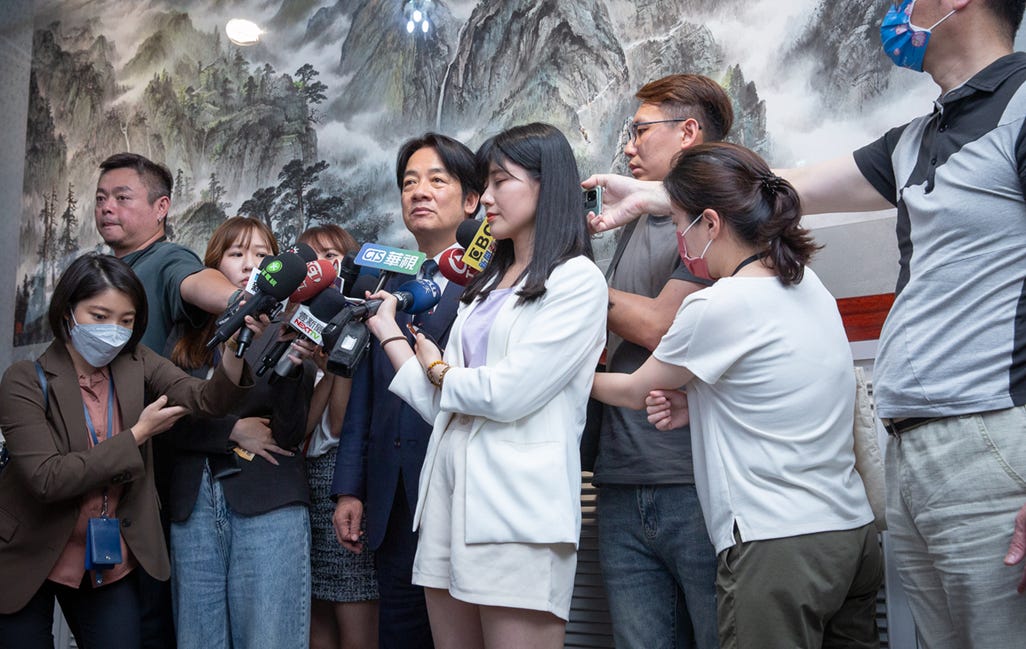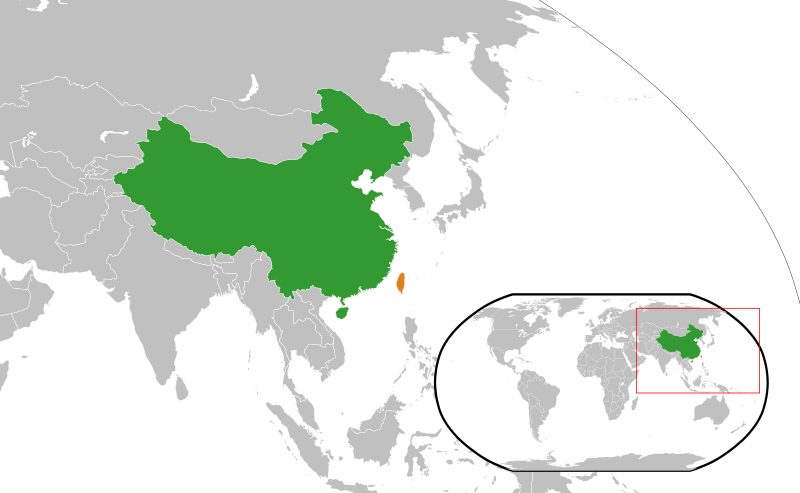The Taiwan Question
The citizens of Taiwan have cast their votes, and Beijing is not amused
The presidential election in Taiwan was held last Saturday, and ‘the people’ chose the wrong guy. Well, ‘wrong,’ as far as mainland China’s communist government is concerned, anyhow.
To the rest of the world, however? The election of the Democratic Progressive Party (DPP) candidate, Lai Ching-te, is a watershed moment. Welcomed by most western governments, it has also raised many concerns about the increasingly-divisive Taiwan question.
Lai, who will be succeeding fellow DPP member President Tsai Ing-wen, is perceived to be even more of a pro-independence advocate than the outgoing Tsai, which has global leaders on edge… and Beijing in a meltdown.
I cannot say I blame them.

Backgrounding Taiwan
I remember when I was first exposed to the Taiwan question. While my ire toward Beijing initially arose in 1989 (with the Tiananmen Square massacre in Beijing), it wasn’t until I read the 1997 book, The Coming Conflict with China (by Richard Bernstein and Ross H. Munro), when I truly began to understand how dangerous the Taiwan situation really is.
It has been an obsession of mine ever since.
The history of how we got here is extensive and convoluted, but to nutshell it: In the years after World War II, infighting between the pro-Communist mainland (PRC) and pro-Nationalists in Taiwan (ROC) caused the US to side with Taiwan; despite its own aggressive repressions, the western world generally considered the ROC to be the official China, since they were never going to side with the PRC’s Chairman, Mao Zedong.
Keep in mind: Both nations considered themselves the ‘China.’
Stay in the loop, and fight social-media suppression! Subscribe to The Stone Age today!
Then the 1970’s happened. In 1971 the United Nations recognized the PRC and the mainland as the official ‘China’ (essentially forcing the ROC out of that body), then the following year U.S. President Richard Nixon visited Beijing. Events progressed from there, and by the end of the decade the onerous ‘One China’ policy was solidified, which - in theory and on paper - honored China’s historical claims to Taiwan.
Just one problem: The U.S. had, and still has, commitments to protect Taiwan from any aggression from the mainland. As such, Taiwan now operates as an independent-though-unrecognized ‘self-governing republic,’ all while under the constant threat of PRC-claims on the nation.
It is also at the mercy of whatever government happens to be in place in Washington D.C., with the degree of support Taiwan receives ebbing and flowing depending on who is in charge during any given year.
As I said… convoluted.

The Tsai Factor
Once democratic reforms took root in the latter part of the 20th century, the issue of Taiwanese independence (officially recognized independence, at any rate) from Beijing has been slowly but persistently growing, and at this point has pretty much become the entirety of the Taiwan question.
From the perspective of the PRC, said-issue has swung wildly from relative calm to panicked concern, depending on whom the Taiwanese people voted into power. As such, the last eight years have fueled the fires of anger in Beijing.
Which brings us to the presidency of Dr. Tsai Ing-wen, one of the most intriguing presidencies of modern times. Elected in 2016, she was not only the first female leader in Taiwan, she was also the first woman in all of Asia to serve as president while not being born into a political family. Her education spans three continents, and her rise in the DPP was as traditional as any you can find in party politics; dependable and principled, yet also evolutionary.
Constantly on-the-go and don’t have time to read? You can now listen to every story I post here on The Stone Age - grab the Substack app, open an article, and press ‘play.’
It is the latter of those three which has caused Beijing much consternation, for throughout Tsai’s leadership her rigidity toward the mainland has grown stronger and stronger. While she never crossed the line into calling for an outright two-state solution, she utilized savvy, personality, and grit to make sure it was always in the background, ever available to be deployed if necessary.
Even in the abstract such a stance is unthinkable to the boys in Beijing, of course, and they have let their displeasure be known. Official protests have been lodged, international pressure has been ramped up, and even threatening military exercises have been held; through it all, Tsai has maintained a steady hand at the helm of state.
And now (despite warnings from Beijing to the Taiwanese people pre-election) her vice-president, Lai Ching-te - a man Beijing refers to as a ‘dangerous separatist’ - is slated to succeed her as president.
To many, this is the proverbial bell which cannot be un-rung.

An Inevitable War?
The vote last weekend sent a clear message to Beijing: The people in Taiwan are not at all interested in falling under the thumb of the repressive PRC. They have been enjoying the Liberty which comes with a quasi-republican form of government, and they are not willing to give that up - no matter what assurances the mainland might offer.
And that lack of trust - irony of ironies - is all Beijing’s fault.
See, Taiwan witnessed how Hong Kong [HK] has been treated since it reverted back to mainland control in 1997, and they remember that HK citizens were once offered the very same assurances. As such, the Taiwanese people know what to expect with PRC rule, and they know there is nothing good to be had there.
So what we have here are two immutable forces: The majority of Taiwanese people do not wish to be part of mainland China, and Beijing refuses to acknowledge any other potential outcome. As PRC strength and power continues to grow they get more and more restless about implementing a final solution, while the ROC remains defiant and unrelenting.
Also - again, and this is important to remember - we are committed to protect Taiwan from a mainland attack. With force, if necessary.
It seems, given the current geopolitical climate, a global war arising from the Taiwan question may be inevitable - what do you think?
If it is, a logical question would be, ‘Will it occur soon?’ That… is difficult to ascertain.
From a purely logistical standpoint, China is not ready. Despite their BRICS efforts, the economic power of the PRC is still far too integrated with U.S. interests. In addition, while they have upped their invasion ‘migrants seeking asylum’ tactics to move assets into the U.S., and have continued to purchase U.S. land where available, they are still not yet in the position to pick a fight they can win.
However…
We also have to consider the situation at home. We are in the throes of the weakest leadership the U.S. has experienced in decades. The military is slowly - openly - being spayed and neutered from within, and many of the upcoming generation have been indoctrinated into the belief (in part by the Chinese-ish social network, TikTok) that even the concept of western culture is genuinely evil.
And if you think something is ‘evil’… why would you risk your life to defend it?
Add to that fresh aggression on the part of Beijing, and the ominous assurances that their beef is not with ALL Taiwanese people? From the PRC’s perspective, the perceived weakness of their potential adversary - meaning us - might be too ripe an opportunity to ignore.
So if I had to answer the question of, “Soon?” I honestly do not know, and - while I work very hard to fret not over that which I have no control - I would be lying if I didn’t admit that answer concerns me.
Why? Because it is the first time in my life I cannot confidently answer that question with a firm “No - not ‘soon.’” As such, while, “I do not know,” is not, “Yes,” I still recommend moving forward with sagacity.
This means addressing your health (through diet and exercise) while tending to your stocks as your means permit, and striving to shift your focus to local concerns; basically, prepare yourself for the worst case scenario. Hope for the best, yes - never, ever lose ‘hope’ - but still prepare, because at this point? The ‘worst case’ may be unavoidable.
May be.
Thank you for your continued support, and - if not already a subscriber - join me as we build a unique Substack subculture of information, entertainment, and enlightenment.
When The Badge Matters
Perhaps now, more than ever, paying attention to local matters is critical. Here is why and how...







Well researched and well said. I'm ever optimistic that the internet will be the downfall of dictatorships. As more young people are engaged on the internet, the less appealing the dictatorships become. Really, how many people are lined up at the borders of Russia, Iran, China and North Korea hoping for entry and potential citizenship?
All China has to do is wait. They play the long game. They're short on capital now, but what's the rush? They'll wait for the right circumstances.